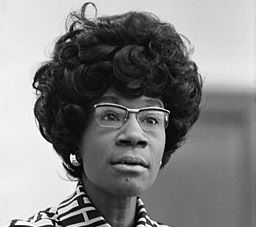By Sandy Wilson, Executive Vice President, Managing Director of Sales, Riverdale & Harlem
In honor of Women’s History Month, I would like to highlight one of the most significant female American Political leaders in our history, and that is Shirley Chisholm. She became the first African American woman elected to the United States Congress in 1968. Ms. Chisholm represented the 12th Congressional district which is in Central Brooklyn and primarily known for the historic Bedford Stuyvesant neighborhood. She was a distinguished and resolute Congresswoman who was a great leader and champion for human rights for all. She served her community for seven consecutive terms in the United States Congress from 1969 to 1983. She served with honor and distinction. And in 1972, she was the first African American candidate to seek a nomination from a major U.S. political party for President of the United States.
Born in Brooklyn November 30, 1924 Shirley’s father Charles Christopher St. Hill and her mother Ruby Seale St. Hill migrated to New York from Guiana and Barbados respectively. Like so many migrants of the time, Shirley’s father worked in a factory making burlap bags, and Shirley’s mother was a skilled seamstress and domestic worker. And as often happened with children of immigrants back then, Shirley and her siblings went to Barbados to live with their maternal grandmother Emaline Seale in Barbados. They returned to New York 4 years later. In Shirley’s book, “Unbought and Unbossed” she said of her grandmother, “Granny gave me strength, dignity, and love. I learned from an early age that I was somebody”. Her Granny instilled in Shirley that which would carry her through life! Additionally Shirley was introduced to activism and politics at an early age by her father who was an avid supporter of Marcus Garvey, the well-known political activist and founder of The Universal Improvement Association. This environment served to mold Shirley into the political leader that she would later become.
Shirley went on to excel as a young student attending Girls’ High School in Bed Sty which was then known as an academically superior school. She graduated with honors and went on to apply and was accepted at her colleges of choice, Vassar and Oberlin. However she was not able to attend due to the expenses of room and board. But of course, Shirley found a way to get to college and so she attended Brooklyn College which close to home. While there, Shirley won many honors, among them graduating Cum Laude in 1946.
Shirley married Conrad Chisholm in 1949. He was a private investigator specializing in lawsuits due to the negligence of others. No doubt his cases influenced Shirley’s keen sense of fairness as she was able to observe first-hand the inequities and injustices experienced by her husband’s clients.
Fast forward to Shirley’s political career. She was elected to the New York State Assembly and served from 1965 to 1968. Her successes in the state legislature including the ground breaking achievement of securing unemployment benefits for domestic worker which was a monumental task! She was also responsible for launching the state run SEEK Program (Search for Education, Elevation, and Knowledge) which enabled students to enter college by attending remedial training programs thereby preparing them to excel while in college. These achievements were significant for Shirley and showcased her talents as someone who can get things done within the political arena!
In 1968 Shirley ran for a seat in the Congressional House of Representatives. And when Shirley got to Congress, there was no stopping her! An early story tells of when Shirley was assigned to the House Agricultural Committee. Not really a prime assignment for someone with an urban constituency, she turned that assignment into a win. She used her platform on the committee to spearhead a new initiative designed to expand and augment the food stamps programs with the donation of surplus food. She was instrumental in organizing and getting the food stamps program expanded to include additional benefits for women and children. Today that program is called the WIC Program which stands for Special Supplemental Nutrition Program for Woman and Infants. In 1971, while in Congress, Shirley was an early pioneer of the healthcare for all movement by co-sponsoring a bill which called for government health insurance for all. Her achievements were legendary and far too many to list here.
During her later years, and after leaving Congress in 1983, Shirley lived in a quiet suburb of Buffalo after she retired from Congress. She resumed her interest in education and was named to the Purrington Chair at the Mount Holyoke College, an all-women’s college. She was also a visiting professor at Spellman, the historical black college for women. In 1993, President Bill Clinton named her to be Ambassador to Jamaica however she could not serve due to poor health. She was inducted into the National Women’s Hall of Fame in 1993. I recommend reading Shirley’s autobiography “Unbought and UnBossed” or “Shirley Chisholm, Champion of Black Feminist Power Politics”, written by Anastasia C. Curwood.
Ms. Chisholm died at age 80, peacefully on January 1, 2005 at home in Florida, having left a legacy of achievement, activism, and strength, for which we are all grateful. And after many years of delays, and almost 100 years since her birth in Brooklyn, New York City has approved a statue of Ms. Chisholm which will be erected at the entrance to Prospect Park. Chisolm's life will also be the topic of a brand new biopic, starring Regina King, set to release mid-March. It is a fitting testimony to her life well lived.
